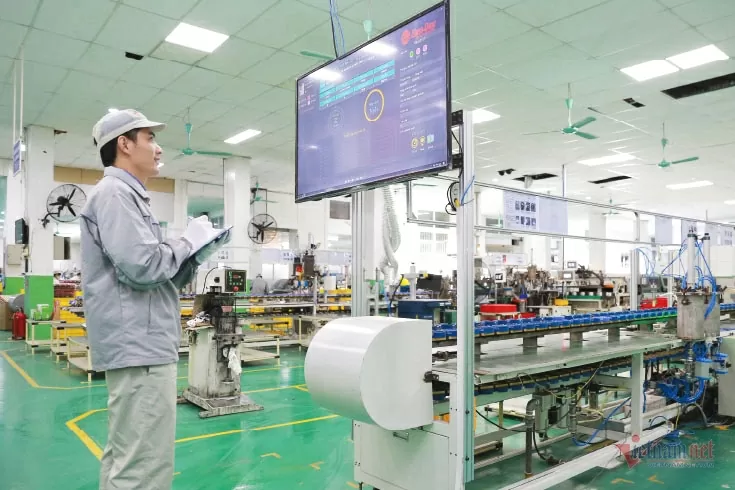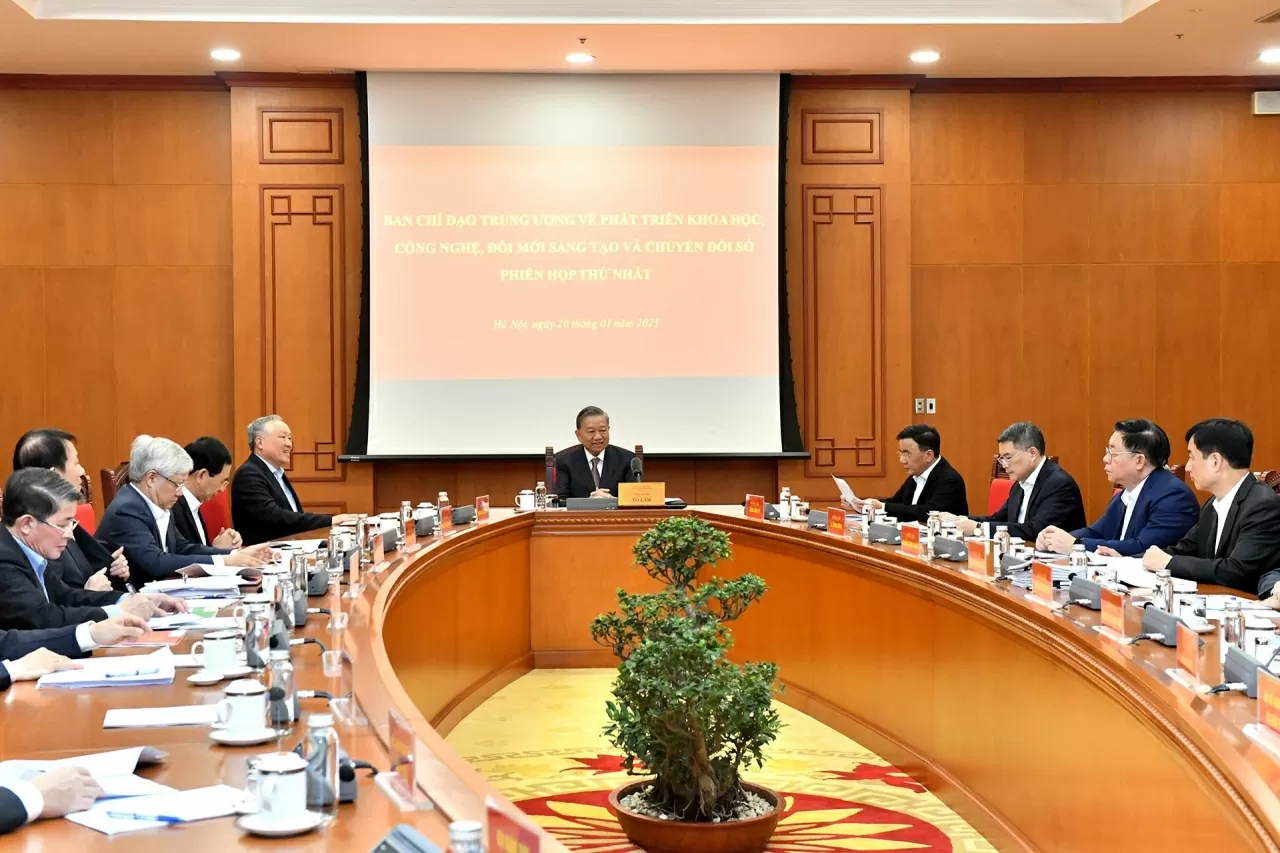The world, including Vietnam, is facing many challenges and opportunities in the digital age. What is the solution for Vietnam to promote the positive role of digital transformation in the new era?
 |
| General Secretary To Lam speaks at the National Conference on Breakthroughs in Science, Technology, Innovation and National Digital Transformation on January 13. (Source: VGP) |
Digital transformation has recently become a concept that is often mentioned in the media. It is difficult to give an exact, clear and specific concept of digital transformation because the process of applying digital transformation will be different in each different field.
However, it is also possible to give a short and easy-to-understand definition that digital transformation is the integration of digital technologies into all fields. The world, including Vietnam, is facing many challenges and opportunities in digital transformation.
For ordinary people, digital transformation changes the way we live, work and transact with each other.
For businesses, digital transformation helps businesses cut operating costs, reach more customers in a longer period of time, help leaders make decisions faster and more accurately thanks to a timely and transparent reporting system, thereby optimizing employee productivity.
As for the state, digital transformation uses data and digital technology to change user experience with services provided by the state, change business processes, change the model and operation methods of state management agencies.
Vietnam has always been an active member in promoting cooperation with other countries to develop the digital economy and digital society. So what is the solution to help Vietnam promote the positive role of digital transformation in the era of national development?
Digital transformation from developed economies
 |
| The Information and Communications sector continues to accelerate the national digital transformation process on all three pillars: Digital Government, Digital Economy and Digital Society. (Source: Vietnam+) |
Microsoft's 2017 research showed that in Asia, in 2017 alone, the impact that digital transformation brought to GDP was about 6%, in 2019 it was 25% and by 2021 it was 60%.
In Korea, the government plays a leading role, strongly promoting innovation activities, and is supported by leading technology corporations; developing smart factories, applying smart manufacturing technology, providing financial and technical support to improve production efficiency.
Korea also established innovation centers to support startups and research institutions to develop new digital solutions together; there are many online platforms to connect, and financial support from the government (such as the K-Startup Grand Challenge fund).
Malaysia has many programs such as financial support and tax incentives implemented through digital transformation funds to provide loans and grants to businesses; establish innovation centers; launch commercial platforms to support businesses and digital industrial cluster models.
Taiwan (China) focuses on core technologies in the semiconductor industry, builds an inclusive digital society, ensures that everyone has access to technology; makes good use of open data to promote innovation and create economic value from data.
Meanwhile, Germany's approach to digital transformation is quite different and interesting, balancing the government on one side and the development of an ecosystem that allows businesses to lead their own initiatives on the other; focusing very deeply on digital transformation of high-tech manufacturing applications, strict and standardized data protection laws.
The country also supports the startup community, builds a network of digital hubs, and strengthens public-private cooperation in digital transformation.
According to McKensey's research, in 2025, the impact of digital transformation on US GDP will be about 25%, with Brazil at 35%, and European countries at 36%.
Current status of digital transformation in Vietnam
 |
| Vietnam has a number of successful digital transformation business models. (Source: Vietnamnet) |
In Vietnam, up to 98% of small and medium enterprises are still not fully aware of the role of digital transformation in the 4.0 Industrial Revolution.
Currently, only 31% of businesses are in the early stages of digital transformation, 53% are in the observation stage and only 3% have basically completed this process.
Vietnamese SMEs alone show that this type of business is still facing barriers in the digital transformation process such as lack of digital skills and human resources (17%), lack of a strong enough information technology platform to enable digital transformation (16.7%), lack of digital thinking or challenges in digital culture within the business (15.7%).
It must be frankly admitted that the speed and breakthrough in digital transformation development in Vietnam is still slow.
The scale, potential and level of digital transformation capacity are still far behind that of developed countries; awareness of many levels, sectors, officials, civil servants and people about digital transformation is not complete and profound.
In addition, research, application of science, technology, and innovation have not made any breakthroughs, have not mastered strategic and core technologies; legal institutions, mechanisms, and policies have not met requirements; high-quality human resources are still lacking; infrastructure is not synchronous, especially digital infrastructure, which still has many limitations; information security, safety, and data protection still face many challenges.
" Boost " from Resolution 57 of the Politburo
 |
| The first meeting of the Central Steering Committee on Science, Technology, Innovation and Digital Transformation under the chairmanship of General Secretary To Lam, January 20. (Source: Nhan Dan) |
On December 22, 2024, the Politburo issued Resolution No. 57-NQ/TW, marking a very prominent milestone, creating a breakthrough in the development of science, technology, innovation and national digital transformation. This also shows the attention of the Politburo and General Secretary To Lam himself to these particularly important fields.
The resolution shows that developing science, technology, innovation and national digital transformation are the top important breakthroughs. People and businesses are the center, the main subjects, resources and driving forces.
Scientists are the key factor. The State plays a leading, promoting and facilitating role in the development of science, technology, innovation and national digital transformation.
By 2030, Vietnam will be among the leading countries in cyber security, safety, data security and data protection. By 2045, digital transformation, science, technology and innovation will be key factors in making Vietnam a developed, high-income country.
Some solutions
 |
Prime Minister Pham Minh Chinh and NVIDIA Chairman Jensen Huang witnessed the signing and handover of the Agreement between Minister of Planning and Investment Nguyen Chi Dung - representing the Vietnamese Government and Mr. Jay Puri, Executive Vice President of Global Operations of NVIDIA, December 2024. (Source: VGP) |
Vietnam has had success with rice, making the country one of the world's leading food exporters.
To achieve that success, the Party and State have had effective and timely strategies and policies, creating favorable conditions for farmers, businesses and the government.
Up to now, facing the opportunity to transform the nation, bringing the country into a new era with the foundation of digital transformation, science, technology, and innovation are the key driving forces, creating breakthroughs to promote the country's economic and social development to achieve the set goals.
To do this, Vietnam needs to proactively and actively implement a number of solutions.
Firstly, the Government needs to prioritize the development of digital infrastructure, digital human resources, and digital solutions through innovation and startups; attract digital investment and digital technology; promote digital connections between businesses and actors in the digital transformation ecosystem, and increase access to digital resources.
Second, from the practical references of countries around the world, it is necessary to research and develop digital transformation support centers, establish support funds, build digital connection platforms, and build digital transformation tools.
Third, strengthen international cooperation in science and technology development, digital transformation and innovation. The Government needs to continue to research and promote access solutions, call on "eagles", business groups, and the world's leading billionaires in new technology (such as Apple, Nvidia, Microsoft, etc.) to set up offices, headquarters, build research and development centers on artificial intelligence, data centers, and expand business investment in Vietnam).
Fourth, it is necessary to consider and research to come up with timely and effective solutions to resolve bottlenecks, or "bottlenecks" of "bottlenecks" (institutions, infrastructure and human resources) as affirmed by General Secretary To Lam in the article on Removing bottlenecks of bottlenecks .
In short, digital transformation is an inevitable trend and a process of profound change in all economic and social activities. The digital transformation process should and must have the participation of the entire political system, people and businesses; people are the center, the subject and the target of the development of the digital transformation process.
Digital transformation is only truly successful when every citizen actively participates, enjoys the benefits that digital transformation brings, and no one is left behind.
Source

























































Comment (0)